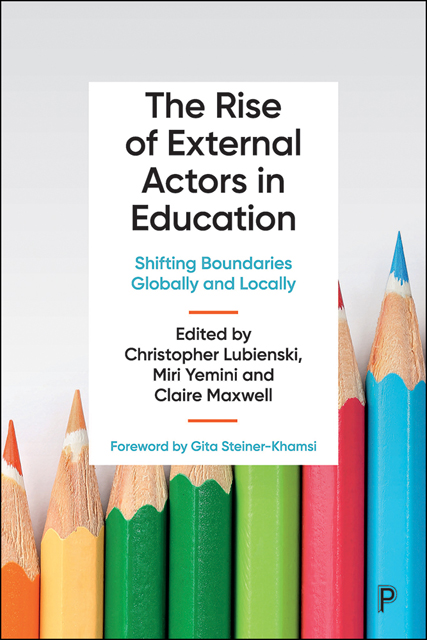Book contents
- Frontmatter
- Contents
- List of figures and tables
- Notes on contributors
- Foreword
- Introduction
- 1 Collective parental involvement: an in-between actor
- 2 When teachers become the external actor: private tutoring and endogenous privatisation in Cambodia
- 3 Cross-sectoral alliances in charter schools: the role of boards of directors from for-profit and non-profit sectors
- 4 A communitarian framework for understanding the relations between schools and NGOs
- 5 PISA for sale? Creating profitable policy spaces through the OECD’s PISA for Schools
- 6 Historical reconfigurations of internal/external actors in Danish educational testing practices
- 7 A short history of external agency involvement within education in contemporary Poland
- 8 New philanthropy in the heterarchical governance of education in Brazil
- 9 Venture philanthropy and the rise of external actors in Australian education
- 10 Power struggle in education policy change: the role of knowledge actors in structural reforms in Chile
- Conclusion: Complexity and intentionality of external actors in education
- Index
4 - A communitarian framework for understanding the relations between schools and NGOs
Published online by Cambridge University Press: 13 October 2022
- Frontmatter
- Contents
- List of figures and tables
- Notes on contributors
- Foreword
- Introduction
- 1 Collective parental involvement: an in-between actor
- 2 When teachers become the external actor: private tutoring and endogenous privatisation in Cambodia
- 3 Cross-sectoral alliances in charter schools: the role of boards of directors from for-profit and non-profit sectors
- 4 A communitarian framework for understanding the relations between schools and NGOs
- 5 PISA for sale? Creating profitable policy spaces through the OECD’s PISA for Schools
- 6 Historical reconfigurations of internal/external actors in Danish educational testing practices
- 7 A short history of external agency involvement within education in contemporary Poland
- 8 New philanthropy in the heterarchical governance of education in Brazil
- 9 Venture philanthropy and the rise of external actors in Australian education
- 10 Power struggle in education policy change: the role of knowledge actors in structural reforms in Chile
- Conclusion: Complexity and intentionality of external actors in education
- Index
Summary
Introduction
Since the 1970s, the number of non-governmental organisations (NGOs) has increased substantially in many sectors, including education (Hoff & Hickling-Hudson, 2011; Yemini et al, 2018). As part of this trend, NGOs have gradually become critical actors in many educational systems. Facilitated by neoliberal policies that seek private solutions to public problems (Dvir & Yemini, 2017), many NGOs have become involved in the creation and provision of education, often as an alternative to public schooling (Kamat, 2004; Resnik, 2011). It is commonly argued by neoliberal advocates that NGOs, unhindered by sectarian interests, may be better placed to promote the welfare and education of the most vulnerable members of our societies (Lubienski & Perry, 2019). This development has in many places led to a ‘rolling back’ of states’ responsibilities for education, or a situation where the government ‘buys’ services from NGOs and other providers to deliver on its education commitments.
NGOs’ visibility and roles have spread into virtually all educational systems across the world, taking various forms within Global North and Global South contexts, but they are particularly prominent across parts of the African continent (Miller-Grandvaux et al, 2002). Yet whether and how NGOs can contribute to the development and provision of education is shaped by cultural, national, and social context. Thus, in this chapter, I propose and defend a conceptual framework for promoting a communitarian approach to support educational developments between local communities and NGOs.
The chapter draws on recent scholarship on the concept of ‘communitarianism’, developed in the last quarter of the twentieth century, which emphasises the importance of collectivism, particularism, and communalism (Etzioni, 1995; Studdert, 2005; Oplatka, 2019). The focus of my contribution is to argue that in many local contexts, schools are likely to manage their external relations with NGOs through particular cultural, social, and organisational approaches that are tightly entwined to their own cultural frames of reference, which may be quite different to those of the broader nation state within which they are located. Put another way, I argue that effective partnerships between schools and NGOs in many contexts, especially across parts of the Global South, critically depend on the extent to which global and local NGOs draw on cultural scripts and educational ideologies that have values within the local community where the schools are located.
- Type
- Chapter
- Information
- The Rise of External Actors in EducationShifting Boundaries Globally and Locally, pp. 80 - 90Publisher: Bristol University PressPrint publication year: 2022

